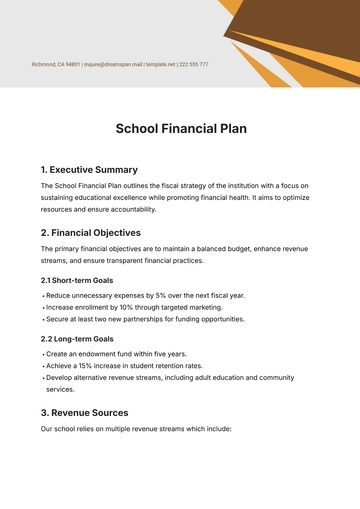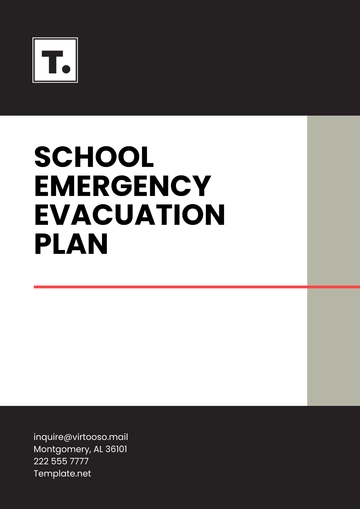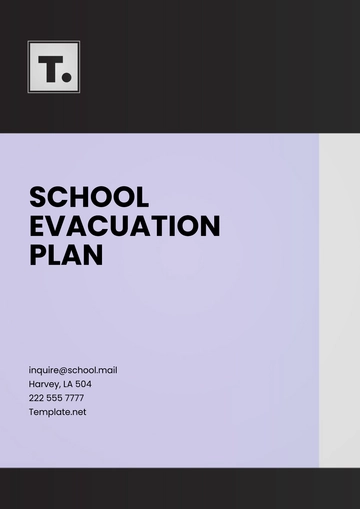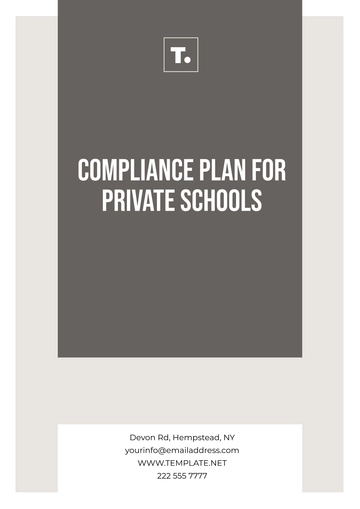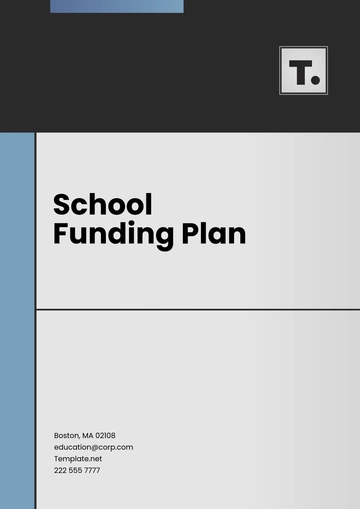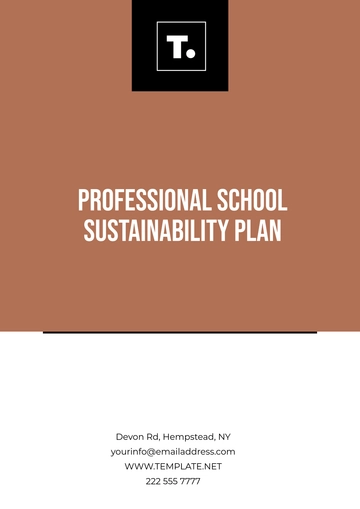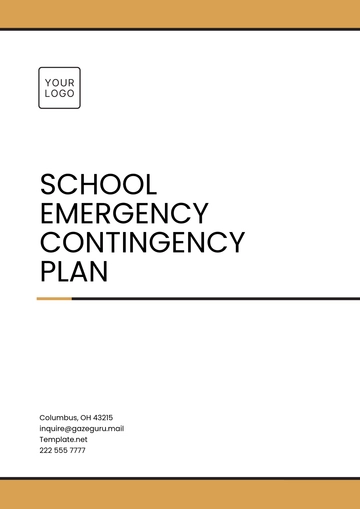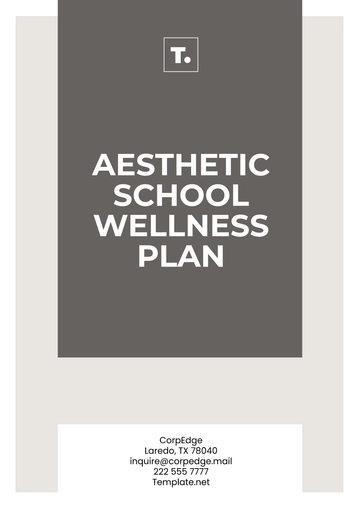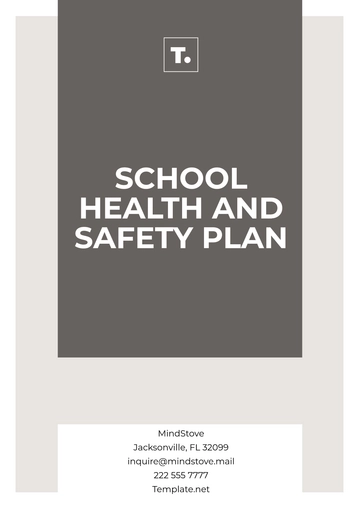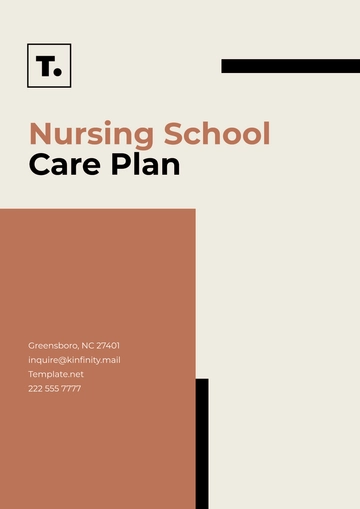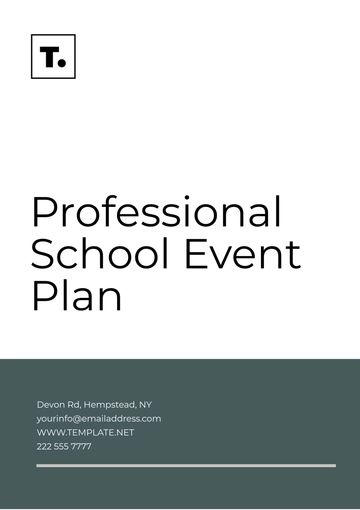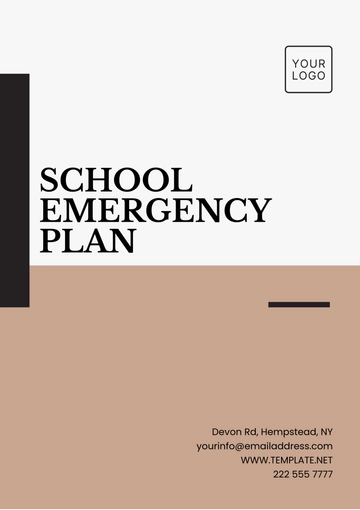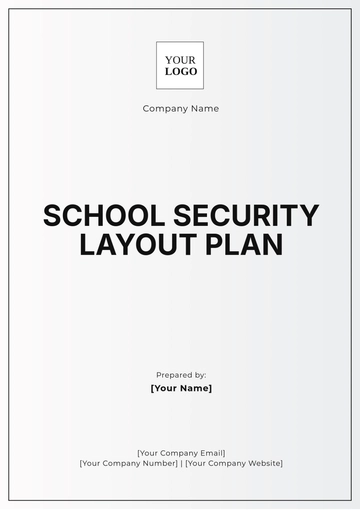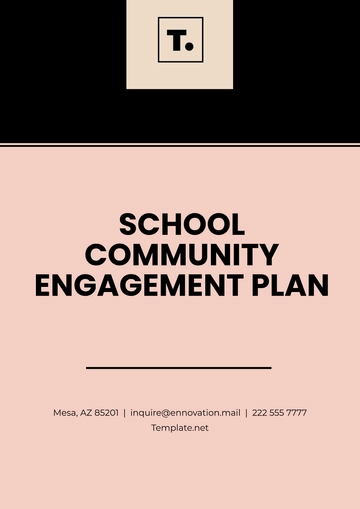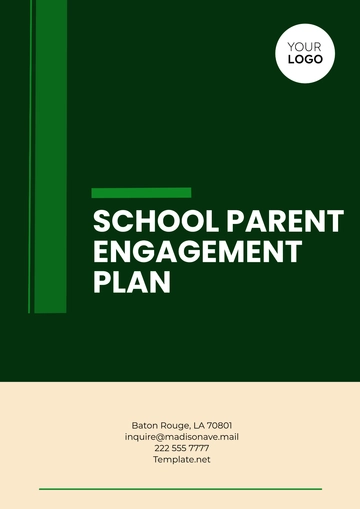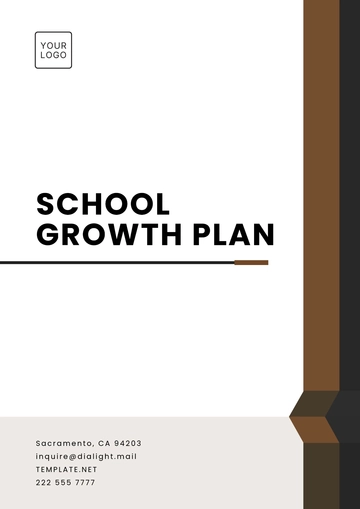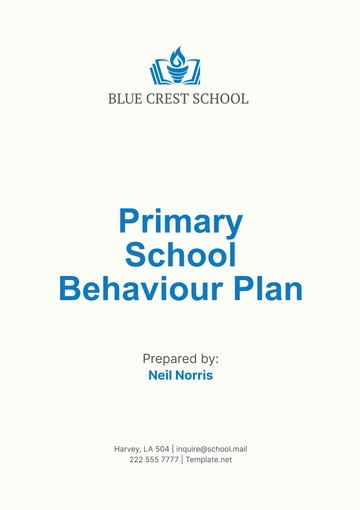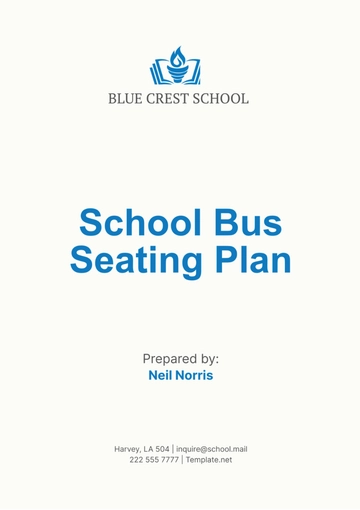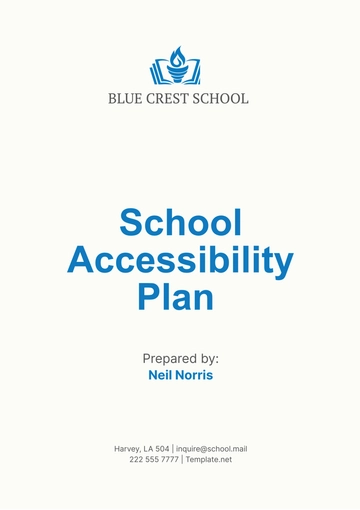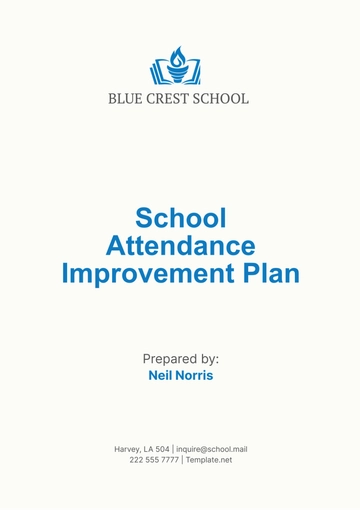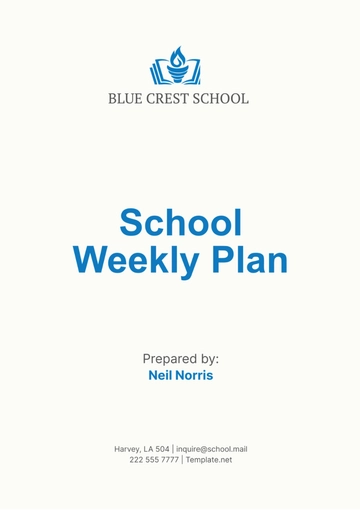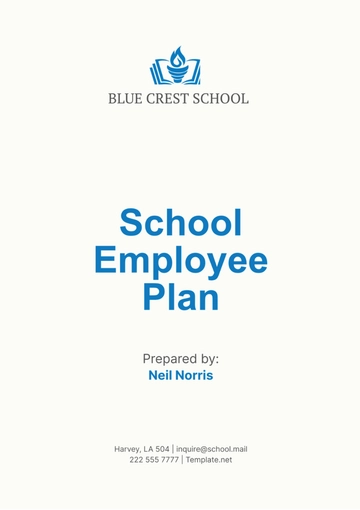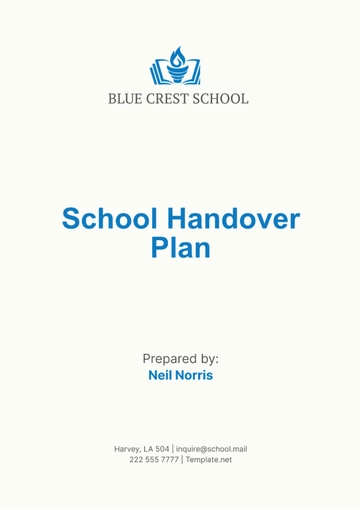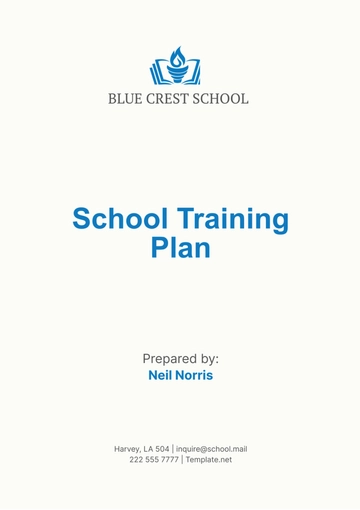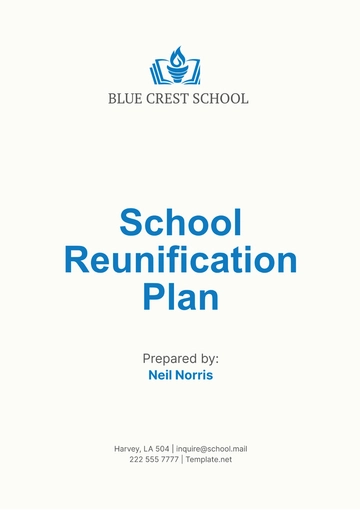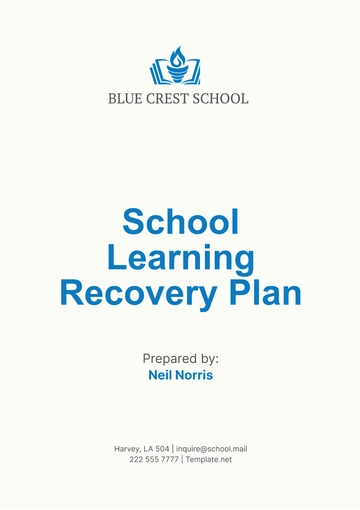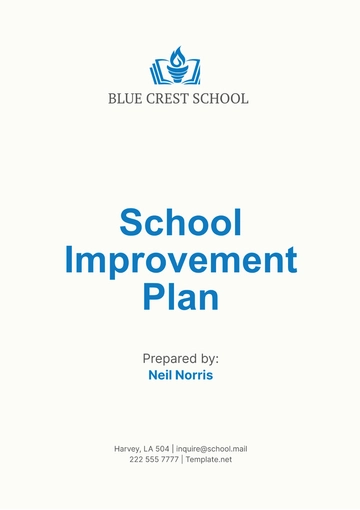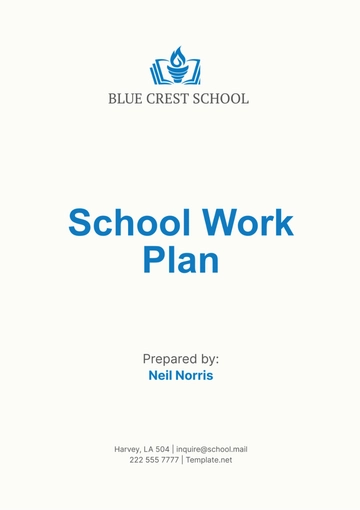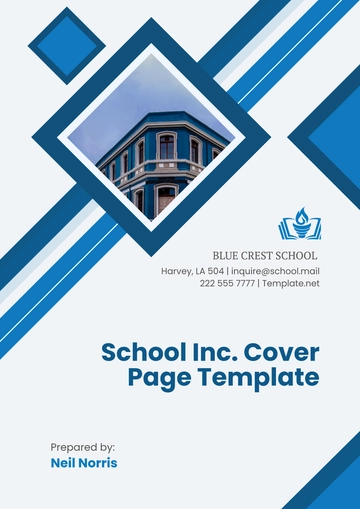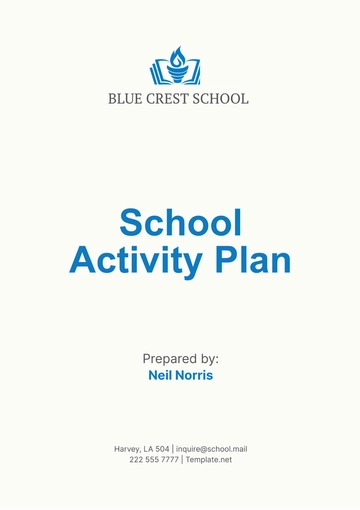Free School Activity Plan
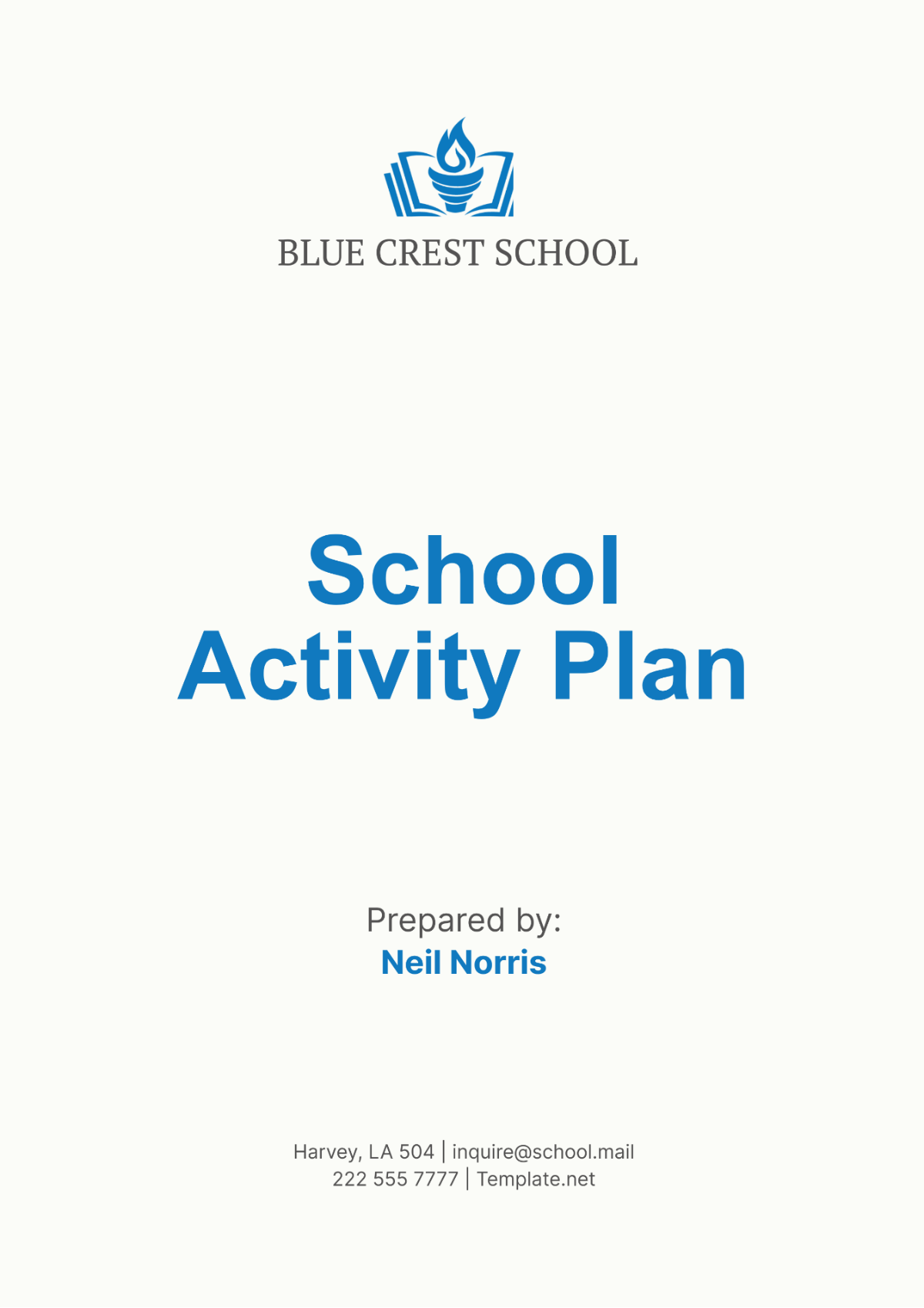
I. Executive Summary
The purpose of this School Activity Plan is to outline a series of engaging and educational activities for the academic year 2054-2055. These activities are designed to enrich the students' learning experiences, promote holistic development, and foster a sense of community within the school. Our proposal includes a variety of activities that cater to different interests and developmental stages, ensuring that all students benefit from the program.
The total budget for this plan is $75,000, which will cover all aspects of the activities, including staffing, materials, transportation, and promotional efforts. The implementation timeline spans from September 2054 to June 2055, with activities strategically scheduled throughout the school year to maximize participation and impact.
The anticipated outcomes of this activity plan include improved student engagement, enhanced academic performance, and the development of essential life skills. By providing a diverse range of activities, we aim to support the overall well-being of our students and create a vibrant and inclusive school environment.
II. Academic Enrichment Activities
A. Science and Technology Fair
To foster a love for science and technology, we will organize a Science and Technology Fair. This event will provide students with an opportunity to showcase their innovative projects and ideas.
Project Proposals: Students will be encouraged to submit project proposals outlining their ideas. These proposals will be reviewed by a panel of teachers to ensure they meet the criteria and are feasible within the given timeframe.
Workshops: Leading up to the fair, we will conduct a series of workshops on topics such as scientific research methods, project presentation skills, and the use of technology. These workshops will equip students with the necessary skills to develop and present their projects effectively.
Mentorship: Each student or team will be paired with a mentor who is an expert in their chosen field. The mentors will provide guidance and support throughout the project development process, helping students overcome challenges and refine their ideas.
Judging and Awards: On the day of the fair, projects will be judged by a panel of experts. Awards will be given in various categories, such as Best Innovation, Best Presentation, and People's Choice. This recognition will motivate students to put forth their best efforts and celebrate their achievements.
Community Involvement: The fair will be open to parents, local community members, and industry professionals. This involvement will create a sense of community and provide students with valuable networking opportunities.
B. Reading and Literacy Programs
To enhance literacy skills and promote a love for reading, we will implement a comprehensive Reading and Literacy Program. This program will include a variety of activities and initiatives designed to engage students of all reading levels.
Reading Challenges: Monthly reading challenges will be organized, encouraging students to read a certain number of books or pages. Incentives such as certificates and small prizes will be awarded to those who meet the challenges.
Book Clubs: Book clubs will be established for different grade levels, allowing students to discuss and share their thoughts on selected books. These clubs will foster a love for reading and improve comprehension and critical thinking skills.
Author Visits: We will invite authors to visit the school and speak to students about their books and the writing process. These visits will inspire students to explore their own creativity and develop their writing skills.
Library Enhancements: The school library will be enhanced with new books, comfortable reading areas, and digital resources. These improvements will make the library a more inviting place for students to spend time and explore new literature.
III. Extracurricular Activities
A. Sports and Physical Education
Physical education and sports play a vital role in the overall development of students. Our plan includes a range of sports activities and physical education programs to promote physical fitness and teamwork.
Intramural Sports: We will organize intramural sports leagues for various sports such as soccer, basketball, and volleyball. These leagues will encourage friendly competition and help students develop teamwork and leadership skills.
Fitness Programs: Regular fitness programs will be conducted, including activities like yoga, aerobics, and running clubs. These programs will promote physical health and well-being among students.
Sports Clinics: Professional athletes and coaches will be invited to conduct sports clinics, providing students with advanced training and techniques. These clinics will inspire students to pursue excellence in their chosen sports.
Health and Nutrition Workshops: Workshops on health and nutrition will be organized to educate students on the importance of a balanced diet and healthy lifestyle. These workshops will complement the physical education programs and promote overall well-being.
Annual Sports Day: An Annual Sports Day will be held, featuring a variety of athletic events and competitions. This event will foster school spirit and provide an opportunity for students to showcase their athletic abilities.
B. Arts and Cultural Activities
Arts and cultural activities are essential for fostering creativity and cultural awareness. Our plan includes a variety of programs to engage students in the arts and celebrate cultural diversity.
Art Exhibitions: We will organize art exhibitions to showcase students' artistic talents. These exhibitions will provide a platform for students to express themselves creatively and receive recognition for their work.
Music and Drama Clubs: Music and drama clubs will be established, offering students opportunities to participate in performances and productions. These clubs will enhance students' performing arts skills and build confidence.
Cultural Festivals: Annual cultural festivals will be held to celebrate the diverse cultures represented in our school community. These festivals will include performances, food, and activities that highlight different cultural traditions.
Art Workshops: Regular art workshops will be conducted, covering various mediums such as painting, sculpture, and digital art. These workshops will help students develop their artistic skills and explore new forms of expression.
IV. Student Leadership and Development
A. Leadership Programs
Leadership programs are essential for developing students' leadership skills and preparing them for future roles. Our plan includes a range of leadership development activities.
Student Council: A student council will be established, giving students the opportunity to represent their peers and participate in school governance. This experience will teach students about leadership, responsibility, and teamwork.
Leadership Workshops: Workshops on leadership skills, public speaking, and conflict resolution will be organized. These workshops will equip students with the skills necessary to be effective leaders.
Community Service Projects: Students will be encouraged to participate in community service projects. These projects will promote civic responsibility and provide students with the opportunity to make a positive impact in their community.
Peer Mentoring: A peer mentoring program will be implemented, where older students mentor younger students. This program will foster a supportive school environment and help develop leadership skills in both mentors and mentees.
B. Personal Development Programs
Personal development programs are designed to support students' emotional and social growth. Our plan includes a variety of initiatives to promote personal development.
Life Skills Workshops: Workshops on topics such as time management, study skills, and stress management will be organized. These workshops will help students develop important life skills that are essential for success.
Counseling Services: Counseling services will be available to support students' emotional well-being. These services will provide a safe space for students to discuss their concerns and receive guidance.
Mindfulness Programs: Mindfulness programs will be implemented to help students manage stress and develop a sense of inner peace. These programs will include activities such as meditation and yoga.
Social Skills Groups: Social skills groups will be established to help students develop interpersonal skills and build positive relationships. These groups will provide a supportive environment for students to practice social interactions.
Career Guidance: Career guidance programs will be offered to help students explore their future career options and make informed decisions. These programs will include career assessments, guest speakers, and internships.
V. Logistics and Implementation
A. Staffing and Training
To ensure the successful implementation of our activities, appropriate staffing and training are essential. The following table outlines the staffing requirements and training plans for each activity:
Activity | Staff Required | Training Duration | Key Training Components |
|---|---|---|---|
Science and Tech Fair | 5 Coordinators | 2 weeks | Project Management, Mentorship |
Reading Programs | 3 Facilitators | 1 week | Literacy Instruction, Engagement Strategies |
Sports Programs | 4 Coaches | 2 weeks | Coaching Techniques, Safety Protocols |
Arts and Culture | 3 Instructors | 2 weeks | Artistic Techniques, Event Planning |
Leadership Programs | 2 Advisors | 1 week | Leadership Development, Workshop Facilitation |
Personal Development | 3 Counselors | 1 week | Counseling Techniques, Program Management |
Science and Tech Fair: Five coordinators will be trained over a two-week period in project management and mentorship. This training will equip them to effectively support students in developing and presenting their projects, ensuring a successful and educational fair.
Reading Programs: Three facilitators will undergo a one-week training program focused on literacy instruction and engagement strategies. This training will prepare them to deliver engaging and effective reading programs that enhance students' literacy skills.
Sports Programs: Four coaches will be trained over a two-week period in coaching techniques and safety protocols. This training will ensure that they can provide high-quality sports programs that promote physical fitness and safety.
Arts and Culture: Three instructors will be trained over a two-week period in artistic techniques and event planning. This training will prepare them to lead engaging arts and cultural activities that foster creativity and cultural awareness.
Leadership Programs: Two advisors will undergo a one-week training program in leadership development and workshop facilitation. This training will equip them to effectively support and guide students in developing their leadership skills.
Personal Development: Three counselors will be trained over a one-week period in counseling techniques and program management. This training will prepare them to deliver effective personal development programs that support students' emotional and social growth.
B. Scheduling and Coordination
Effective scheduling and coordination are essential for the smooth implementation of our activities. The following table outlines the key milestones and timelines for each activity:
Activity | Start Date | End Date | Key Milestones |
|---|---|---|---|
Science and Tech Fair | October 1, 2054 | December 15, 2054 | Proposal Submission, Workshops, Fair Day |
Reading Programs | September 15, 2054 | June 15, 2055 | Monthly Challenges, Author Visits, Book Clubs |
Sports Programs | September 15, 2054 | June 15, 2055 | Intramural Leagues, Sports Clinics, Annual Sports Day |
Arts and Culture | October 1, 2054 | June 1, 2055 | Art Exhibitions, Cultural Festivals, Art Workshops |
Leadership Programs | October 1, 2054 | June 1, 2055 | Student Council Elections, Leadership Workshops, Community Service Projects |
Personal Development | September 15, 2054 | June 15, 2055 | Life Skills Workshops, Counseling Services, Career Guidance |
Science and Tech Fair: The Science and Technology Fair will begin on October 1, 2054, and end on December 15, 2054. Key milestones include proposal submission, workshops, and the fair day. This timeline ensures that students have ample time to develop their projects and receive the necessary support.
Reading Programs: The Reading and Literacy Programs will run from September 15, 2054, to June 15, 2055. Key milestones include monthly reading challenges, author visits, and book club meetings. This timeline provides continuous literacy engagement throughout the school year.
Sports Programs: The sports and physical education programs will start on September 15, 2054, and end on June 15, 2055. Key milestones include the start of intramural leagues, sports clinics, and the annual sports day. This schedule ensures regular physical activity and skill development for students.
Arts and Culture: Arts and cultural activities will take place from October 1, 2054, to June 1, 2055. Key milestones include art exhibitions, cultural festivals, and art workshops. This timeline allows for a variety of creative and cultural events throughout the year.
Leadership Programs: Leadership programs will commence on October 1, 2054, and conclude on June 1, 2055. Key milestones include student council elections, leadership workshops, and community service projects. This schedule provides ongoing leadership development opportunities.
Personal Development: Personal development programs will be conducted from September 15, 2054, to June 15, 2055. Key milestones include life skills workshops, counseling services, and career guidance sessions. This timeline supports continuous personal growth for students.
VI. Budget and Resource Allocation
A. Detailed Budget
The following chart and table outline the budget allocation for each activity and the resources required:
Activity | Budget | Resources Required |
|---|---|---|
Science and Tech Fair | $15,000 | Materials, Workshop Supplies, Awards |
Reading Programs | $10,000 | Books, Author Fees, Promotional Materials |
Sports Programs | $20,000 | Equipment, Uniforms, Clinic Fees |
Arts and Culture | $10,000 | Art Supplies, Event Costs, Instructor Fees |
Leadership Programs | $10,000 | Workshop Materials, Community Service Supplies |
Personal Development | $10,000 | Counseling Resources, Workshop Materials |
Total | $75,000 |
Science and Tech Fair: The budget for the Science and Technology Fair is $15,000. This allocation covers materials, workshop supplies, and awards. The funds will ensure that students have the resources needed to develop and present their projects effectively.
Reading Programs: The Reading and Literacy Programs have a budget of $10,000. This allocation covers books, author fees, and promotional materials. These resources will enhance the literacy program and provide engaging reading opportunities for students.
Sports Programs: The budget for sports programs is $20,000. This allocation covers equipment, uniforms, and clinic fees. These resources will support a comprehensive sports program that promotes physical fitness and skill development.
Arts and Culture: Arts and cultural activities have a budget of $10,000. This allocation covers art supplies, event costs, and instructor fees. These funds will ensure the successful implementation of creative and cultural activities.
Leadership Programs: The budget for leadership programs is $10,000. This allocation covers workshop materials and community service supplies. These resources will support the development of leadership skills and promote civic responsibility.
Personal Development: Personal development programs have a budget of $10,000. This allocation covers counseling resources and workshop materials. These funds will support students' emotional and social growth.
B. Resource Management
Effective management of resources is crucial for the successful implementation of our activities. The following table outlines the key resource management strategies:
Resource | Management Strategy |
|---|---|
Financial Resources | Regular Budget Reviews, Transparent Reporting |
Human Resources | Training and Development, Performance Monitoring |
Material Resources | Inventory Management, Efficient Procurement |
Time Resources | Detailed Scheduling, Regular Progress Reviews |
Financial Resources: Regular budget reviews and transparent reporting will ensure that financial resources are managed effectively. This strategy will help us stay within budget and allocate funds efficiently.
Human Resources: Training and development programs, along with performance monitoring, will ensure that staff are well-prepared and motivated. Effective human resource management is essential for delivering high-quality activities.
Material Resources: Inventory management and efficient procurement processes will ensure that material resources are available when needed. This strategy will help us avoid shortages and ensure smooth implementation of activities.
Time Resources: Detailed scheduling and regular progress reviews will help us manage time resources effectively. This strategy will ensure that activities are implemented on time and milestones are met.
VII. Marketing and Promotion
A. Communication Strategies
Effective communication strategies are essential for promoting our activities and ensuring high participation. The following table outlines the key communication methods and target audiences:
Communication Method | Target Audience |
|---|---|
Newsletters | Students, Parents, Staff |
Social Media | Students, Parents, Community Members |
School Website | Students, Parents, Community Members |
Flyers and Posters | Students, Parents, Staff |
Newsletters: Regular newsletters will be sent to students, parents, and staff to provide updates on upcoming activities and events. These newsletters will ensure that all stakeholders are informed and engaged.
Social Media: Social media platforms will be used to promote activities and share updates with students, parents, and community members. These platforms will help us reach a wider audience and encourage participation.
School Website: The school website will feature a dedicated section for activities and events. This section will provide detailed information and serve as a central hub for all activity-related updates.
Flyers and Posters: Flyers and posters will be displayed throughout the school to promote upcoming activities. These materials will ensure that students and staff are aware of the events and encourage participation.
B. Engagement Strategies
Engaging students, parents, and the community is crucial for the success of our activities. The following table outlines the key engagement strategies:
Engagement Strategy | Target Audience |
|---|---|
Parent-Teacher Meetings | Parents, Teachers |
Community Partnerships | Local Businesses, Organizations |
Student Ambassadors | Students |
Incentive Programs | Students |
Parent-Teacher Meetings: Regular parent-teacher meetings will be held to discuss the activity plan and gather feedback. These meetings will ensure that parents are involved and supportive of the activities.
Community Partnerships: Partnerships with local businesses and organizations will be established to support and promote our activities. These partnerships will provide additional resources and enhance community involvement.
Student Ambassadors: Student ambassadors will be selected to promote activities among their peers. These ambassadors will play a key role in encouraging participation and creating excitement around the events.
Incentive Programs: Incentive programs will be implemented to motivate students to participate in activities. These programs will include rewards such as certificates, prizes, and recognition.
VIII. Evaluation and Feedback
A. Evaluation Methods
To continually improve our activities, we will implement a system for collecting and evaluating feedback. The following table outlines the methods and frequency of feedback collection:
Feedback Method | Frequency | Description |
|---|---|---|
Online Surveys | Post-activity | Sent via email to participants |
In-person Surveys | During activities | Collected by staff |
Comment Cards | At check-out | Provided at the front desk |
Social Media Monitoring | Ongoing | Tracking mentions and reviews online |
Online Surveys: Online surveys will be sent to participants after each activity. These surveys will include questions about their overall experience, satisfaction levels, and suggestions for improvement. The data collected will provide valuable insights into what participants enjoyed and areas that may need enhancement.
In-person Surveys: Staff will collect in-person feedback during activities to gather immediate reactions and suggestions. This real-time feedback will help us address any issues promptly and make on-the-spot adjustments if necessary.
Comment Cards: Comment cards will be available at check-out for participants to provide feedback on their experience. This method allows for anonymous feedback, encouraging participants to share honest opinions and insights.
Social Media Monitoring: We will actively monitor social media platforms for mentions and reviews of our activities. This ongoing monitoring will help us gauge public perception and respond to any concerns or compliments in a timely manner.
B. Data Analysis and Reporting
The data collected from feedback methods will be thoroughly analyzed to identify trends, strengths, and areas for improvement. The following table outlines the key components of our data analysis and reporting strategy:
Data Analysis Component | Description |
|---|---|
Quantitative Analysis | Statistical analysis of survey responses |
Qualitative Analysis | Thematic analysis of open-ended responses |
Reporting | Regular reports shared with stakeholders |
Action Plans | Development of action plans based on findings |
Quantitative Analysis: We will perform statistical analysis on the quantitative data collected from surveys to identify patterns and measure satisfaction levels. This analysis will provide a clear picture of overall performance and highlight specific areas that need attention.
Qualitative Analysis: Open-ended survey responses and comments from feedback methods will be analyzed thematically to identify common themes and sentiments. This qualitative analysis will provide deeper insights into participants' experiences and suggestions.
Reporting: Regular reports summarizing the feedback and analysis findings will be shared with key stakeholders, including school administrators, staff, and parents. These reports will ensure transparency and keep everyone informed about the performance of our activities.
Action Plans: Based on the findings from our data analysis, we will develop action plans to address any identified issues and enhance our activities. These plans will outline specific steps and timelines for implementing improvements.
IX. Conclusion
This School Activity Plan of [Your Company Name] for the academic year 2054-2055 is a comprehensive and well-rounded proposal aimed at enriching students' educational experiences. By offering a diverse range of academic, extracurricular, leadership, and personal development activities, we are committed to fostering a supportive and engaging school environment.
Our carefully planned logistics, budget, and resource allocation ensure that these activities will be implemented effectively and efficiently. Through strategic marketing and promotion, we will maximize participation and engagement, while our robust evaluation and feedback system will help us continuously improve and adapt our programs to meet the needs of our students. This plan represents our dedication to providing high-quality educational opportunities that promote holistic development and prepare our students for future success.
- 100% Customizable, free editor
- Access 1 Million+ Templates, photo’s & graphics
- Download or share as a template
- Click and replace photos, graphics, text, backgrounds
- Resize, crop, AI write & more
- Access advanced editor
Plan school activities effectively with the School Activity Plan Template! This versatile template from Template.net is designed to be fully editable and customizable, allowing you to customize it to fit various activities. Use the AI Editor Tool to refine your plan, ensuring that all details are covered and clearly communicated!
You may also like
- Finance Plan
- Construction Plan
- Sales Plan
- Development Plan
- Career Plan
- Budget Plan
- HR Plan
- Education Plan
- Transition Plan
- Work Plan
- Training Plan
- Communication Plan
- Operation Plan
- Health And Safety Plan
- Strategy Plan
- Professional Development Plan
- Advertising Plan
- Risk Management Plan
- Restaurant Plan
- School Plan
- Nursing Home Patient Care Plan
- Nursing Care Plan
- Plan Event
- Startup Plan
- Social Media Plan
- Staffing Plan
- Annual Plan
- Content Plan
- Payment Plan
- Implementation Plan
- Hotel Plan
- Workout Plan
- Accounting Plan
- Campaign Plan
- Essay Plan
- 30 60 90 Day Plan
- Research Plan
- Recruitment Plan
- 90 Day Plan
- Quarterly Plan
- Emergency Plan
- 5 Year Plan
- Gym Plan
- Personal Plan
- IT and Software Plan
- Treatment Plan
- Real Estate Plan
- Law Firm Plan
- Healthcare Plan
- Improvement Plan
- Media Plan
- 5 Year Business Plan
- Learning Plan
- Marketing Campaign Plan
- Travel Agency Plan
- Cleaning Services Plan
- Interior Design Plan
- Performance Plan
- PR Plan
- Birth Plan
- Life Plan
- SEO Plan
- Disaster Recovery Plan
- Continuity Plan
- Launch Plan
- Legal Plan
- Behavior Plan
- Performance Improvement Plan
- Salon Plan
- Security Plan
- Security Management Plan
- Employee Development Plan
- Quality Plan
- Service Improvement Plan
- Growth Plan
- Incident Response Plan
- Basketball Plan
- Emergency Action Plan
- Product Launch Plan
- Spa Plan
- Employee Training Plan
- Data Analysis Plan
- Employee Action Plan
- Territory Plan
- Audit Plan
- Classroom Plan
- Activity Plan
- Parenting Plan
- Care Plan
- Project Execution Plan
- Exercise Plan
- Internship Plan
- Software Development Plan
- Continuous Improvement Plan
- Leave Plan
- 90 Day Sales Plan
- Advertising Agency Plan
- Employee Transition Plan
- Smart Action Plan
- Workplace Safety Plan
- Behavior Change Plan
- Contingency Plan
- Continuity of Operations Plan
- Health Plan
- Quality Control Plan
- Self Plan
- Sports Development Plan
- Change Management Plan
- Ecommerce Plan
- Personal Financial Plan
- Process Improvement Plan
- 30-60-90 Day Sales Plan
- Crisis Management Plan
- Engagement Plan
- Execution Plan
- Pandemic Plan
- Quality Assurance Plan
- Service Continuity Plan
- Agile Project Plan
- Fundraising Plan
- Job Transition Plan
- Asset Maintenance Plan
- Maintenance Plan
- Software Test Plan
- Staff Training and Development Plan
- 3 Year Plan
- Brand Activation Plan
- Release Plan
- Resource Plan
- Risk Mitigation Plan
- Teacher Plan
- 30 60 90 Day Plan for New Manager
- Food Safety Plan
- Food Truck Plan
- Hiring Plan
- Quality Management Plan
- Wellness Plan
- Behavior Intervention Plan
- Bonus Plan
- Investment Plan
- Maternity Leave Plan
- Pandemic Response Plan
- Succession Planning
- Coaching Plan
- Configuration Management Plan
- Remote Work Plan
- Self Care Plan
- Teaching Plan
- 100-Day Plan
- HACCP Plan
- Student Plan
- Sustainability Plan
- 30 60 90 Day Plan for Interview
- Access Plan
- Site Specific Safety Plan
